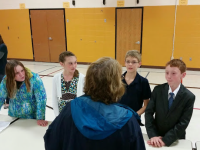PBL Project Planning: Matching Projects to Standards
Two adventurous fifth grade teachers explore their new PBL pilot program as they learn what it means to align student projects with learning standards.
Your content has been saved!
Go to My Saved Content.Editor's Note: Matt Weyers and co-author Jen Dole, teachers at Byron Middle School in Byron, Minnesota, present the third installment in a year-long series documenting their experience of launching a PBL pilot program.
Project Planning: The Evolution
When we began to plan our first cross-curricular PBL project, we were extremely excited. The process of thoughtfully designing learning experiences that would blend our learning goals with a strong measure of authenticity for the students was a challenge we looked forward to. We went into the summer operating on two project-planning assumptions:
- That Jen and Matt (the authors) would be true generalists, allowing the students to simply have "class" and flow back and forth between the two of us without dividing the day into specific subjects.
- That we would enter the school year with a skeleton outline for the bulk of the 10-12 projects we wanted to complete throughout the year.
Unfortunately, we ended up falling short on both accounts. We ascertained quite quickly that we would need a daily schedule to ensure that all students were exposed to the necessary content. The logistics of managing students who were "choosing their own adventure" in their project work was too much for us to handle at that point. In addition, the creation of a daily schedule required us to specialize by subject. Matt would ensure coverage of language arts and social studies standards, and Jen would secure learning experiences for science and math. Similarly, the time required to plan projects and create resources was greater than we anticipated. We entered the school year with multiple rough project ideas, but only three that we felt were adequately developed for implementation.
Mapping Projects to Standards
Project planning has been one of the most exhaustive yet rewarding aspects of the PBL methodology. To begin planning, we initially sifted through electronic PBL project libraries for ideas, but eventually we came to understand that in order for projects to be authentic to our students and local community, we needed to plan and develop them ourselves. We found the combination of Buck Institute for Education's Project Planning Documents and the curriculum-mapping feature of the online program Mastery Connect to be the "Holy Grail" of project-planning tools.
The Project Planning Documents allow us to formulate the overall structure and function of the project, including specific standards addressed, driving question, assessments, and authentic audience. On the other hand, Mastery Connect gives us the ability to electronically assign standards across all subjects to specific projects delineated on the Project Planning Documents. We are then able to create quizzes and rubrics designed to electronically assess the specific standards that we feel students should master. The highlight of this approach is that student results will automatically populate into Mastery Connect, allowing us to provide targeted interventions to students not yet demonstrating proficiency.
Depth of Content and Parent Involvement
As with any new experience, using PBL has forced us to reevaluate our own beliefs and understandings in a multitude of ways. The first reevaluation is our assumption of how a school day should be organized. We are growing more comfortable with the notion that not all projects lend themselves well to all major content areas. For example, we've spent the first six weeks of school working on a microfinance project through Kiva.org, but have not yet taught a single science lesson. However, we've reached significant depth of content with our students while asking them to:
- Utilize expository writing from internet research
- Multiply decimals and percentages while calculating interest rates and return on investment
- Practice speaking, viewing, and media literacy standards by preparing speeches for our Kiva Fundraiser night.
This depth of content has been far beyond what the two of us have ever previously accomplished.
The second reevaluation is the level of parent education and communication that needs to take place. We've consistently heard from families that they would like to know in greater detail what specific skills (teaching standards) we are working with on a day-to-day basis. There have already been several conversations with families concerned that their children will not be receiving enough traditional instruction to keep them on pace with their peers in other classrooms. We have come to understand through these conversations that, although we know as teachers what specific standards we're addressing, if we want PBL to become a more widespread method of teaching in our district, we need to meet these concerns head on through increased communication. At the suggestion of one of our concerned parents, we will form a parent-led "focus group." This group will be designed to inform families about the tenets of PBL, as well as synthesize any questions, comments, or celebrations that families might have into a singular communication with us.
In summation, this year has been exactly the type of authentic learning experience we sought for our students and for ourselves as professionals.
